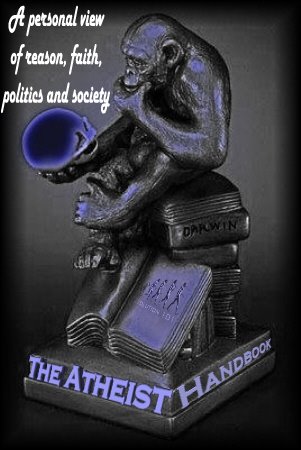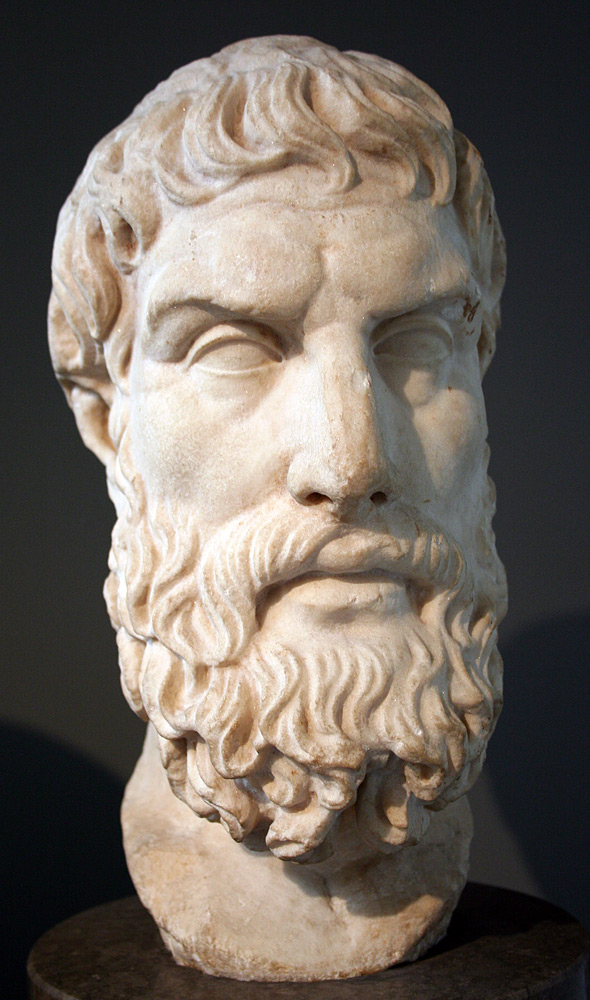
Jim Ebsary thinks that religious ideas are a big problem in our society and should be challenged with reason and logic. He’s a firm supporter of the scientific method and critical thinking, the separation of church and state, and freedom of and from religion. His e mail is jebsary@cogeco.ca
Some material adapted from: Harris, S., The problem with atheism. newsweek.washingtonpost.com/onfaith/sam_harris/2007/10/the_problem_with_atheism.html
---
Why I don’t call myself an atheist
To me, the lack of evidence for God, and the silliness and suffering that still exists under the blanket of religion, calling myself an "atheist" seems like a logical position. But, why do I call myself a term that was thought up by believers as the enemy of their belief, someone to blame society’s problems on? There are plenty of us that identify ourselves as atheists or agnostics. In a recent poll (2005), about a quarter of us Canucks don’t believe in gods. That’s a really big minority within a country that is overwhelmingly Christian. I also believe there are enough people around who consider themselves spiritual, and don’t accept organized religion, which might be at least sympathetic to the way we feel. However I think we might be making a mistake by identifying ourselves as atheists.
What is atheism anyway? I believe that most people simply misunderstand atheism. To me, I think a pretty good definition is “disbelief in gods”. But when people find out that I’m an ‘atheist’, do they identify me only as a person who doesn’t believe in gods, that I base my life on atheism? Atheism doesn’t run my life, and the term doesn’t define me. I don’t have a post-secondary education, I have a family and good friends, I hold down a job (for now), I’m a productive person in society, and I try to be decent. I just don’t believe in gods, which I usually don’t think is worth mentioning, but I do tend to speak up when I think something is a really bad idea. My humble opinion is that everyone is usually atheistic when it comes to someone else’s beliefs that don’t agree with their own.
I think that "atheist" is a term that shouldn’t exist, just like we don't need a word for someone who rejects fortune-tellers. We don’t call people "non fortune-tellers,” or “a-fortune-tellers." All we need are words like "reason," "evidence," and "bullshit" to put fortune-tellers in their place; it can be the same with religion, or for that matter potential quackery like alternative medicine.
A problem with calling ourselves "atheists" is that every religious person thinks he has The Great Argument against atheism. We've heard these tiresome arguments (and they really are tiresome, because they offer nothing new. But I think it’s important to stay open to these ideas. If someone claims they have irrefutable evidence I will try to listen), and we’re going to keep hearing them as long as we call ourselves atheists. Some are stupid arguments like: atheists can't prove that God doesn't exist; atheism is a belief, just like any other belief; and arrogant arguments like atheists claim to know there is no God. We know the arguments are false, yet every time, we have to defend ourselves. We squander a lot of time doing this.
How many times are we going to defend ourselves against the accusation that Stalin, Hitler, and Pol Pot are the result of atheism? These arguments are not going away. Very articulate and well reasoned people like Sam Harris argued against it in The End of Faith, and Letter to a Christian Nation; Richard Dawkins did the same in The God Delusion; and Christopher Hitchens did the same in God is Not Great. This bullshit argument will be with us for as long as people call themselves "atheists." Religious people accept this argument, the same way they blindly accept the silliness of Pascal’s Wager. Unfortunately, it also convinces people that are moderate in their beliefs.
Consider the misunderstanding of atheists by the MPP’s when they debated abolishing the Lord’s Prayer at the start of Legislature at Queen’s Park. Now, as a result of this debate, atheists are given a moment of silence after the Lord’s Prayer before Legislature. What is an atheist supposed to do with a moment of silence? And, if we were acting as some kind of group, why were we arbitrarily given something we don’t want or need as some form of appeasement?
At the XXVIII World Religions Conference held at University of Waterloo last fall, I sat through speech after speech by MP’s, MPP’s, Mayors, Chiefs of Police, etc, who congratulated us all on our working together to help understand each other’s faith. The Secular Humanist group which attended this session to represent atheists and agnostics was thanked for their ‘faith’, and they have been thanked for their ‘faith’ every time they attended. We were completely ignored and insulted during these speeches. At the end of the conference, we had to sit quietly or leave the room while others prayed. If Secular Humanists have no faith, why are they participating in a World’s Religions Conference? In my experience, Secular Humanists are falsely labelled and dismissed as cranks that ‘take away’ the right to pray and ‘take away’ religious holidays. Usually you will see religious people spreading this myth, but I’ve read comments by my MPP Peter Kormos repeating the insulting remarks about ‘taking away prayer’ during the silly uproar of abolishment of the Lord’s Prayer at Queen’s Park.
So, if atheism isn’t a thing at all, why are we calling ourselves atheists? Atheism isn’t a belief—and still most people believe it is one and attack it like it is. We atheists might be continuing to assist this myth by letting others call us atheists and by even calling ourselves atheists.
It doesn’t help when we make mistakes ourselves. Recently, I had a difficult time trying to reason with a leader of a Humanist group that it was incorrect to capitalize atheist and atheism. His reply was that everyone else does it, so he was just doing the same. He’s over 75 years old; how long has he been making that mistake, just thoughtlessly copying, never questioning, just accepting? Atheism isn’t a proper noun, and shouldn’t be capitalized. Religious people who criticize atheism often capitalize the word in an attempt to strengthen their arguments that atheism is a belief like Christianity or Hinduism.
What would happen if we, as ‘atheists’ just used words like "reason" and "evidence" and “bullshit,” and not call ourselves anything at all? I believe that there are very few people, even among religious fundamentalists, who will admit to being against reason (Incredibly, in a recent report from Skeptical Inquirer (2008), a conference on parapsychology stated that ideas like e.s.p. and psychokinesis might be true because they share the characteristic of always eluding being proven by the scientific method. How’s that for rational thinking?) Fundamentalists usually believe they have sound reasons for believing in God. I don’t think anyone wants to believe anything on bad evidence. Searching for truth shouldn’t be relegated to an interest or lobby group just to be dismissed as some cranky people.
Some material adapted from: Harris, S., The problem with atheism. newsweek.washingtonpost.com/onfaith/sam_harris/2007/10/the_problem_with_atheism.html
---
Why I don’t call myself an atheist
To me, the lack of evidence for God, and the silliness and suffering that still exists under the blanket of religion, calling myself an "atheist" seems like a logical position. But, why do I call myself a term that was thought up by believers as the enemy of their belief, someone to blame society’s problems on? There are plenty of us that identify ourselves as atheists or agnostics. In a recent poll (2005), about a quarter of us Canucks don’t believe in gods. That’s a really big minority within a country that is overwhelmingly Christian. I also believe there are enough people around who consider themselves spiritual, and don’t accept organized religion, which might be at least sympathetic to the way we feel. However I think we might be making a mistake by identifying ourselves as atheists.
What is atheism anyway? I believe that most people simply misunderstand atheism. To me, I think a pretty good definition is “disbelief in gods”. But when people find out that I’m an ‘atheist’, do they identify me only as a person who doesn’t believe in gods, that I base my life on atheism? Atheism doesn’t run my life, and the term doesn’t define me. I don’t have a post-secondary education, I have a family and good friends, I hold down a job (for now), I’m a productive person in society, and I try to be decent. I just don’t believe in gods, which I usually don’t think is worth mentioning, but I do tend to speak up when I think something is a really bad idea. My humble opinion is that everyone is usually atheistic when it comes to someone else’s beliefs that don’t agree with their own.
I think that "atheist" is a term that shouldn’t exist, just like we don't need a word for someone who rejects fortune-tellers. We don’t call people "non fortune-tellers,” or “a-fortune-tellers." All we need are words like "reason," "evidence," and "bullshit" to put fortune-tellers in their place; it can be the same with religion, or for that matter potential quackery like alternative medicine.
A problem with calling ourselves "atheists" is that every religious person thinks he has The Great Argument against atheism. We've heard these tiresome arguments (and they really are tiresome, because they offer nothing new. But I think it’s important to stay open to these ideas. If someone claims they have irrefutable evidence I will try to listen), and we’re going to keep hearing them as long as we call ourselves atheists. Some are stupid arguments like: atheists can't prove that God doesn't exist; atheism is a belief, just like any other belief; and arrogant arguments like atheists claim to know there is no God. We know the arguments are false, yet every time, we have to defend ourselves. We squander a lot of time doing this.
How many times are we going to defend ourselves against the accusation that Stalin, Hitler, and Pol Pot are the result of atheism? These arguments are not going away. Very articulate and well reasoned people like Sam Harris argued against it in The End of Faith, and Letter to a Christian Nation; Richard Dawkins did the same in The God Delusion; and Christopher Hitchens did the same in God is Not Great. This bullshit argument will be with us for as long as people call themselves "atheists." Religious people accept this argument, the same way they blindly accept the silliness of Pascal’s Wager. Unfortunately, it also convinces people that are moderate in their beliefs.
Consider the misunderstanding of atheists by the MPP’s when they debated abolishing the Lord’s Prayer at the start of Legislature at Queen’s Park. Now, as a result of this debate, atheists are given a moment of silence after the Lord’s Prayer before Legislature. What is an atheist supposed to do with a moment of silence? And, if we were acting as some kind of group, why were we arbitrarily given something we don’t want or need as some form of appeasement?
At the XXVIII World Religions Conference held at University of Waterloo last fall, I sat through speech after speech by MP’s, MPP’s, Mayors, Chiefs of Police, etc, who congratulated us all on our working together to help understand each other’s faith. The Secular Humanist group which attended this session to represent atheists and agnostics was thanked for their ‘faith’, and they have been thanked for their ‘faith’ every time they attended. We were completely ignored and insulted during these speeches. At the end of the conference, we had to sit quietly or leave the room while others prayed. If Secular Humanists have no faith, why are they participating in a World’s Religions Conference? In my experience, Secular Humanists are falsely labelled and dismissed as cranks that ‘take away’ the right to pray and ‘take away’ religious holidays. Usually you will see religious people spreading this myth, but I’ve read comments by my MPP Peter Kormos repeating the insulting remarks about ‘taking away prayer’ during the silly uproar of abolishment of the Lord’s Prayer at Queen’s Park.
So, if atheism isn’t a thing at all, why are we calling ourselves atheists? Atheism isn’t a belief—and still most people believe it is one and attack it like it is. We atheists might be continuing to assist this myth by letting others call us atheists and by even calling ourselves atheists.
It doesn’t help when we make mistakes ourselves. Recently, I had a difficult time trying to reason with a leader of a Humanist group that it was incorrect to capitalize atheist and atheism. His reply was that everyone else does it, so he was just doing the same. He’s over 75 years old; how long has he been making that mistake, just thoughtlessly copying, never questioning, just accepting? Atheism isn’t a proper noun, and shouldn’t be capitalized. Religious people who criticize atheism often capitalize the word in an attempt to strengthen their arguments that atheism is a belief like Christianity or Hinduism.
What would happen if we, as ‘atheists’ just used words like "reason" and "evidence" and “bullshit,” and not call ourselves anything at all? I believe that there are very few people, even among religious fundamentalists, who will admit to being against reason (Incredibly, in a recent report from Skeptical Inquirer (2008), a conference on parapsychology stated that ideas like e.s.p. and psychokinesis might be true because they share the characteristic of always eluding being proven by the scientific method. How’s that for rational thinking?) Fundamentalists usually believe they have sound reasons for believing in God. I don’t think anyone wants to believe anything on bad evidence. Searching for truth shouldn’t be relegated to an interest or lobby group just to be dismissed as some cranky people.
















